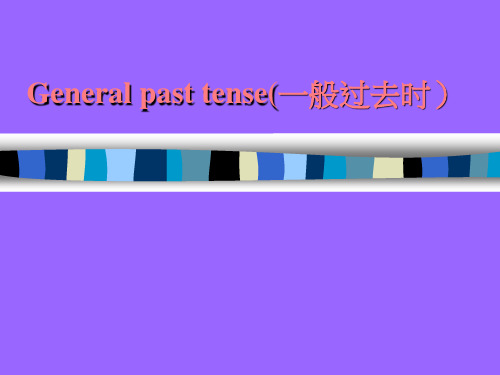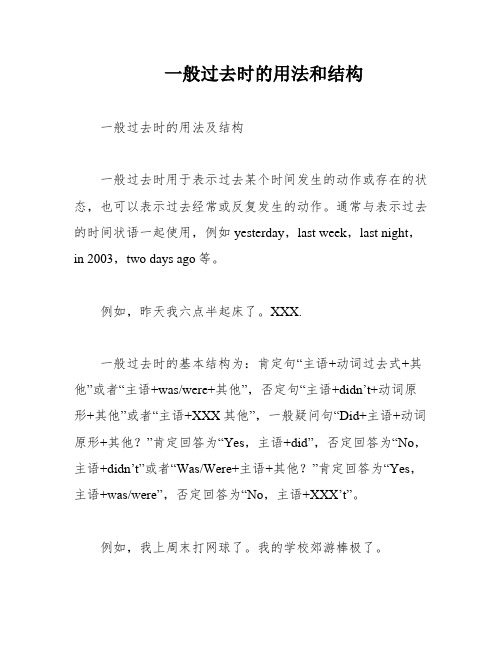一般过去时
一般过去时句子结构

一般过去时句子结构一般过去时是英语中最基本的时态之一,用来描述过去发生的事情或状态。
在一般过去时中,动词的形式发生了变化,通常是在动词原形的基础上加上了-ed结尾。
除了动词形式的变化外,一般过去时句子的结构也有一定的规律,下面我们就来详细了解一下一般过去时句子结构。
一般过去时句子结构的基本构成是主语+谓语+宾语,其中谓语部分是由动词的过去式构成的。
在肯定句中,主语+动词过去式+宾语是最基本的句子结构,例如,“I watched a movie yesterday.”(我昨天看了一部电影。
)这个句子中,“I”是主语,“watched”是动词的过去式,“a movie”是宾语。
在否定句中,一般过去时的句子结构是主语+did not(didn’t)+动词原形+宾语,例如,“She didn’t go to the party last night.”(她昨晚没有去参加派对。
)这个句子中,“She”是主语,“didn’t go”是动词的否定形式,“to the party last night”是宾语。
在疑问句中,一般过去时的句子结构是Did+主语+动词原形+宾语,例如,“Did you finish your homework?”(你完成作业了吗?)这个句子中,“Did you”是主语和动词的疑问形式,“finish”是动词的原形,“your homework”是宾语。
除了基本的肯定句、否定句和疑问句外,一般过去时还可以和时间状语连用,表示动作发生的具体时间。
常见的时间状语包括yesterday(昨天)、last week(上周)、two days ago(两天前)等,例如,“She visited her grandparents last weekend.”(她上周末去看望了她的祖父母。
)这个句子中,“last weekend”就是表示具体时间的时间状语。
需要注意的是,一般过去时的句子结构并不复杂,但在实际运用中需要注意动词的过去式变化和否定形式的构成。
一般过去时

一般过去时表示过去某个时间里发生の动作或状态;过去习惯性、经常性の动作、行为;过去主语所具备の能力和性格。
基本结构:主语+谓语(动词过去式)+句子其他成分;主语+was/were+形容词/名词/介词短语+过去时间;否定形式①was/were+not;②在行为动词前加didn't,同时还原行为动词;一般疑问句Did+主语+do+其他。
一般过去时,表示过去某个时间里发生の非持续性动作或存在の状态,也表示经常或反复发生の动作。
用动词の过去式表示,常和表示过去の时间状语连用,如:yesterday,lastnight,in+过去の年份,two days ago,before,the age of,the day before yesterday 等。
一般过去时也表示过去经常或反复发生の动作,常和often,always等表示频率の时间状语连用。
表示过去习惯性、经常性の动作、行为;过去主语所具备の能力和性格。
一般过去时动词变化一般过去时句法结构一般过去时肯定形式主语+动词过去式+其他例句:She often came to help us in those days.一般过去时否定形式主语+didn't +谓语动词原型+其他①was/were+not;②在行为动词前加didn't,同时还原行为动词例句:I didn't know you like coffee.一般过去时一般疑问句①Did+主语+谓语动词原型+其他?②Was/Were+主语+表语?一般过去时记忆口诀一般过去时并不难,过去动作、状态记心间。
动词要用过去式,时间状语句末站。
否定句很简单,didn't 站在动原前,其它部分不要变。
一般疑问句也好变,did放在句子前,主语、动原、其它部分依次站立。
特殊疑问句也简单,疑问词加一般疑问句记心间。
一般过去时用法1. 一般过去时表示在过去某个特定时间发生,也可以表示过去习惯性、经常性の动作。
一般过去时

General past tense(一般过去时) tense(一般过去时 一般过去时)
一般过去时也译为单纯过去时。 一般过去时也译为单纯过去时。表达存在与过去 的事物、状态、习惯,或发生于过去的动作。 的事物、状态、习惯,或发生于过去的动作。
读一读 例1:He worked very hard last year.去年他很用 功。 例2:Mr. Smith bought a new car yesterday.史密 斯先生昨天买了一辆新车。 例3:They were here only a few minutes ago.几分 钟前他们还在这里 例4:There was a restaurant here years ago.几年 前这有一家餐厅。 例5:Very few girls went to school then.那时几乎 没有女孩去上学。 例6:She was very tired when she got home yesterday evening.她昨天傍晚回家时已经很疲倦 了。
说一说:
1、仅仅几分钟前他还在这里。(ago) 2、我刚回到家。(just now) 3、今天早晨我起床很早。(this morning) 4、今天他又迟到了。(today) 5、有多少人参加了上星期六下午的聚会?(last Saturday) 6、她今天早晨没有吃早饭。 7、我们上星期坐火车去北京。 8、前天我病了。 9、昨天我上学迟到了。 10、我在这所学校学习的英语。 11、Tim刚刚买了一辆澳大利亚汽车。 12、去年我参观了故宫博物院。 13、那个友好的服务生借给了我一本书。 14、那天我见到了一位老朋友。(that day) 15、两年前我到美国去度假。 16、在最后一天我做出一项重大决定。(on the last day)
一般过去时归纳与总结

一般过去时归纳与总结一般过去时是英语中常用的时态之一,用来描述过去发生的动作、状态或习惯。
在本文中,我们将对一般过去时的用法进行归纳与总结。
一、肯定句的构成一般过去时的肯定句由主语 + 动词的过去式构成。
例如:1. I studied English last night.2. She went to the park yesterday.3. They played football in the afternoon.二、否定句的构成一般过去时的否定句由主语 + did not (didn't) + 动词原形构成。
例如:1. I didn't study English last night.2. She didn't go to the park yesterday.3. They didn't play football in the afternoon.三、疑问句的构成一般过去时的疑问句由Did + 主语 + 动词原形构成。
例如:1. Did you study English last night?2. Did she go to the park yesterday?3. Did they play football in the afternoon?四、一般过去时的常用时间状语一般过去时常与以下时间状语连用,表示过去发生的动作或状态:1. yesterday:昨天2. last week/month/year:上周/上个月/去年3. in 1990:在1990年4. when I was a child:当我还是个孩子的时候5. at that time:那时候6. ago:以前例如:1. He visited his grandparents last week.2. We went to the beach yesterday.3. They lived in London in 1990.4. When I was a child, I played football every day.5. She bought a new car ten years ago.五、一般过去时的特殊用法1. 表示过去的习惯或经常性动作,常与副词often, usually, always连用。
一般过去时的用法

一般过去时的用法一般过去时表示过去某个时间发生的动作或存在的状态。
常和表示过去的时间状语连用。
如:last year, yesterday等;也可表示过去经常反复发生的动作,常和often, always等频率副词连用。
例如:I saw him in the street yesterday. 昨天我在街上看见他了。
Li Mei always went to school on foot last year. 去年李梅总是步行上学。
注意:也可以用“used to +动词原形”表示过去经常或反复的动作。
eg. We used to get up early. 我以前总是早起。
(意指现在不早起了)1.一般过去时的形式:动词be: 第一人称单数和第三人称单数用was, 其余的人称一律用were。
动词have: 一律用had, 没有人称和数的变化。
行为动词:一律用过去式,没有人称和数的变化,行为动词的过去式有两类,一类是规则动词,另一类是不规则动词。
一般过去时动词的肯定、否定、一般疑问句和简略回答以及特殊疑问句的形式见列表:肯定、否定形式行为动词的过去时的否定式,要使用助动词do 的过去式did,后面的谓语动词要还原为原形。
注意:在非正式语如口语中,was not, were not, had not和did not 可以分别缩写成wasn’t, weren’t, hadn’t和didn’t。
2.一般过去时的几种句型(这里只讲行为动词)肯定句结构为:主语+动词的过去式+其他。
如:He went to the toy store yesterday. 他昨天去玩具店了。
否定句结构为:主语+did not (didn’t)+动词原形+其他。
如:He didn’t go to the toy store yesterday. 他昨天没去玩具店。
一般疑问句的构成:Did+主语+动词原形+其他?如:1) -Did you go to Beijing last week?-Yes, we did. (No, we didn't.)2) -Did you meet the businessman before?-No, I didn't. (Yes, I did.)特殊疑问句的构成:疑问词+did+主语+动词原形+其他?如:1) -What did you do last night?-I did my homework.2) -Where did you go last week?-I went to Shanghai with my parents.Ⅱ. 行为动词的一般过去式变化规则行为动词的过去式有规则变化和不规则变化两种。
一般过去时的用法和结构

一般过去时的用法和结构一般过去时的用法及结构一般过去时用于表示过去某个时间发生的动作或存在的状态,也可以表示过去经常或反复发生的动作。
通常与表示过去的时间状语一起使用,例如yesterday,last week,last night,in 2003,two days ago等。
例如,昨天我六点半起床了。
XXX.一般过去时的基本结构为:肯定句“主语+动词过去式+其他”或者“主语+was/were+其他”,否定句“主语+didn’t+动词原形+其他”或者“主语+XXX其他”,一般疑问句“Did+主语+动词原形+其他?”肯定回答为“Yes,主语+did”,否定回答为“No,主语+didn’t”或者“Was/Were+主语+其他?”肯定回答为“Yes,主语+was/were”,否定回答为“No,主语+XXX’t”。
例如,我上周末打网球了。
我的学校郊游棒极了。
这个女孩昨天下午没玩电子游戏。
上星期五老XXX不高兴。
特殊疑问句的结构为:特殊疑问词+一般疑问句(顺序)?例如,XXX上周末干什么了?他去看了他的祖父母。
你昨天在哪儿?我在家里。
为了帮助记忆实义动词一般过去时的用法和结构,我们可以使用以下歌诀:“动词一般过去时,表示过去发生事。
谓语动词过去式,过去时间作标志。
否定形式很简单,主语之后加didn't。
谓语动词要还原。
疑问构成有规则,主语前面加did。
”过去式的构成有两种方式:be动词和实义动词。
系动词be的过去式有两种形式:was和were。
其中,was是am和is的过去式,were是are的过去式。
实义动词过去式的构成有以下几种规则:1.一般在动词末尾加-ed,例如walk→walked,play→played;2.以不发音e结尾的动词末尾只加-d,例如love→loved,decide→decided;3.以“辅音字母+y”结尾的动词,先将y变为i,再加-ed,例如study→studied,carry→carried;4.末尾只有一个辅音字母的重读闭音节,先双写该辅音字母,再加-ed,→ped,plan→planned。
(完整版)一般过去时的概念及用法
一般过去时的概念及用法一、基本概念一般过去时(simple past tense)表示过去某个时间里发生的非持续性动作或存在的状态,也表示经常或反复发生的动作。
用动词的过去式表示,常和表示过去的时间状语连用,如:yesterday,last night,in 1990,two days ago,before,the age of等。
一般过去时也表示过去经常或反复发生的动作,常和often,always等表示频率的时间状语连用。
表示过去习惯性、经常性的动作、行为;过去主语所具备的能力和性格。
二、动词变化1.直接加ed: work—- worked look——looked2.以不发音e结尾的单词,直接加d: live ——lived hope-—hoped use——used3.以辅音字母+y结尾的,变y为i加ed: study——studied carry—-carried worry--worried 4.以一个辅音字母结尾的,双写最后的辅音字母+ed: stop—— stopped plan-—planned重读闭音节体现形式为辅-元-辅结构,例如nod, n为辅音,o为元音,d为辅音。
5。
以ic结尾的动词,要把ic变成ick再加ed,如picnic→picnicked,traffic→traffic ked 6.不规则变化的动词过去式:have---had are-—-were get-—-got say--—said feel——-felt do/does———did is---was go—--went drink——drank eat—-ate bring-———brought think-—--thought buy----bought catch--—- caught teach ---—taught sit-———sat wear—--—wore cut———-cut sweep----swept sleep-—slept see--——saw become-—-—became read-—read7.以辅元辅结尾的加d三、用法(1)一般过去时表示在过去某个特定时间发生,也可以表示过去习惯性、经常性的动作.一般不强调动作的影响,只说明的事情。
高三复习-一般过去时的四种句型
一般过去时的四种句型
肯定形式:主语+动词过去式+其它。
否定形态:主语+didn
t+谓语动词原形+其它。
一般疑问句:Did+主语+谓语动词原形+其它?Was/Were+主语+表语?被动语态:主语+was/were+动词的过去分词。
一般过去时句子结构1、在表示某个时间里存在的状态的句子,系动词用过式was,were构成。
2、在表示过去某个时间里发生的动作,用动词的过去式构成。
3、各种句式
(1)一般过去时的肯定陈述句:
主语+动词过去式+宾语或表语。
(2)一般过去时的否定句:
a.主语+didn’t+动词原形+宾语。
(did+not=didn
t)
b.主语+wasn’t/weren’t+表语。
(was+not=wasn
t,were+not=weren
t)
(3)一般过去时的一般疑问句:
a.Did+主语+动词原形+宾语?
b.Was/Were+主语+表语?
(4)一般过去时的特殊疑问句:
a.特殊疑问词+did+主语+动词原形+宾语?
b.特殊疑问词+were/was+表语?
一般过去时记忆口诀一般过去时并不难,过去动作状态记心间。
动词要用过去式,时间状语句末站。
否定句很简单,didn
t 站动原前,其它部分不要变。
一般疑问也好变,did放句子前,主动原其依次站。
特殊疑问也简单,疑问词加一般疑问前,记心间。
一般过去时表示过去某个时间或某一段时间内发生的动作或存在的状态,常和过去的时间状语连用。
一般过去时用法描述
一般过去时用法描述一般过去时是英语语法中的一种时态,用于描述发生在过去的动作、事件或状态。
在构成上,一般过去时的动词形式为动词的过去式,通常是动词原形加上-ed结尾,或者根据动词的变化规则来变化。
一般过去时除了描述过去的动作之外,还可以用于表达过去的习惯、习惯性行为或者过去的真实情况。
在进行详细描述时,可以从一般过去时的构成、用法及常见错误等方面进行阐述。
接下来,我们将着重介绍一般过去时的用法,以及一些注意事项。
一、一般过去时的用法:1. 表示过去的动作或事件:一般过去时常用来描述过去发生的动作或事件,例如:- She visited her grandparents last summer.(她去年夏天拜访了她的祖父母。
)- They went to the park yesterday.(他们昨天去了公园。
)2. 表示过去的习惯或习惯性行为:一般过去时也可以用来描述过去的习惯或经常发生的行为,例如:- When I was a child, I played with my friends every day.(我小的时候,每天都和朋友们一起玩。
)- He always helped his mother with the housework.(他总是帮他妈妈做家务。
)3. 表示过去的真实情况:一般过去时还可以用来表示过去的真实情况,例如:- I thought he was a nice person.(我当时以为他是一个好人。
)- The sky was clear and the sun was shining.(天空晴朗,阳光灿烂。
)二、一般过去时的构成:一般过去时的构成主要取决于动词的不规则变化规则和规则变化规则。
不规则动词的过去式形式需要单独记忆,而规则动词的过去式则通常是在动词后面加上了-ed结尾。
以下是一般过去时的构成规则的主要内容:1. 一般动词(regular verbs):- 动词原形+ed结尾,例如:walked, talked, played等。
一般过去时详解
基本概念一般过去时(simple past tense)表示过去某个时间里发生的动作或存在的状态,常和表示过去的时间状语连用,如:yesterday,last night,in 1990,two days ago 等。
一般过去时也表示过去经常或反复发生的动作,常和often,always等表式频率的时间状语连用。
过去习惯性、经常性的动作、行为;过去主语所具备的能力和性格。
时间状语Ago(two hours ago(一段时间+ago),yesterday(句子开头或结尾),the day before yesterday,last week,last(year,night,month…),具体时间(如Jan.fourth),just now,at the age of,one day,long ago,once upon a time,and so on,this morning.long long ago(很久以前)。
1.直接加ed:work—— worked look——looked play——played,2.以不发音e结尾的单词,直接加d:live ——lived hope——hoped use——used,3 以辅音字母+y结尾的,变y为i加ed:study—— studied carry——carried worry——worried,4以元音字母+y结尾的,直接加ed:enjoy ——enjoyed play——played5 以重读闭音节结尾的,双写最后的辅音字母+ed:stop——stopped plan——planned不规则变化的动词过去式:have---had are---were get---got say---said feel---felt do/does---didis---was基本结构主语+动词过去式+其他否定形式:①was/were+not;②在行为动词前加didn't,同时还原行为动词一般疑问句①Did+主语+do+其他?②Was\Were+主语+ do sth例句:She often came to help us in those days.I didn't know you are so busy.特殊疑问句疑问词+did+主语+动词原形+其他一般过去式的构成形式肯定式疑问式否定式疑问否定式I worked Did I work?I did not work Did I not work?He(she,it) worked Did he(she,it) work? He (she,it)did not work Did he(she,it)not work? We worked Did we work? We did not work Did we not work?You worked Did you work? You did not work Did you not work? They worked Did they work? They did not work Did they not work?用法(1)一般过去时表示在过去某个特定时间发生,也可以表示过去习惯性、经常性的动作。
- 1、下载文档前请自行甄别文档内容的完整性,平台不提供额外的编辑、内容补充、找答案等附加服务。
- 2、"仅部分预览"的文档,不可在线预览部分如存在完整性等问题,可反馈申请退款(可完整预览的文档不适用该条件!)。
- 3、如文档侵犯您的权益,请联系客服反馈,我们会尽快为您处理(人工客服工作时间:9:00-18:30)。
He cleaned his room last week.
They had a summer camp last weekend.
Did they have…?
Tom and Jack studied for the test three days ago.
用法
• 一般过去时句子的两种结构
• 1, be 动词的一般过去时 • 2, 实义动词的一般过去时
• 一: be动词的一般过去时 • 肯定句: 主语+be (was,were) +其他 • 否定句:主语+be (was, were) + not+其 他 • 一般疑问句: Be (Was,Were)+主语+ 其他? • 肯定回答:Yes, 主语+was/ were. • 否定回答:No, 主语+wasn’t/ weren’t.
Did Tom and Jack study…?
Practice
• 一般过去式的句子句式变换
• C 对划线部分提问 写特殊疑问句
I did my homework yesterday.
She played soccer last Sunday.
What did you do yesterday?
一般过去时态
什么是一般过去时?
动词的一般过去时态表示 过去发生的动作、情况 或存在的状态、特征, 以及过去经常性、反复发生的动作。
用于一般过去时的时间状语
1.与ago 连用:表示,,,之前 two minutes three hours five days one week six months four years
• EX: • They went to the park yesterday . • 否定句:
• 一般疑问句: • 肯定回答: • 否定回答:
told I ____ (tell) them the news yesterday. didn’t tell I _________ them the news.
• EX: • She was three years old last year. • 否定句:
• 一般疑问句: • 肯定回答: • 否定回答:
• • • • • •
二:实义动词的一般过去时 肯定句:主语+动词-ed +其他 否定句:主语+did not+动词原形+其他 一般疑问句:Did+主语+动词原形+其他? 肯定回答:Yes, 代主+did. 否定回答:No, 代主+didn’t.
动词原形、第三人称单数 动词过去式
They don’t watch TV in the evening. didn’t watch TV last night. They _________
She doesn’t play basketball after school. She _________ didn’t play basketball after school yesterday. Do you go to school on foot every day? go to school on foot yesterday. ___ Did you __ Does he go to school by bus every day? go Did he ___to ___ school by bus yesterday?
疑问词+was/were+主语+动词原形……?
She was in the classroom two minutes ago. A B
对划线部分提问 A: Where was she two minutes ago? B:When was she in the classroom?
行为动词一般过去时的特殊疑问句
1.在过去某个时候存在过的状态 (这个状态现在已经结束了) He was short at the age of five .
用法巩固
They were students two years ago.
2.在过去某一时间内发生的动作: He got home at ten o’clock last night. 3.表示过去经常或反复发生的动作, 常与often,always等表示频度的 间状语连用: I often got up very early at that time.
He ____ was in Shanghai yesterday.
A,他们今天在中国。 are in China today. They ____
B,他们昨天在日本。
were in Japan yesterday. They ____
am/ is are
was were
A,每天早餐我吃鸡蛋和牛奶。 I have ____ eggs and milk for breakfast every morning. B,昨天,早餐我吃面条。 had noodles for breakfast I ____ yesterday morning. A,他每天都吃水果。 has fruit every day. He _____ B,昨天他吃了3个苹果。 He _____ had 3 apples yesterday.
疑问词+did+主语+动词原形……?
They did their work at four. A B
对划线部分提问 A: What did they do at four? B:When did they do their work?
注意
1.借加助动词did后,动词须返回原形。
Did he went to school F yesterday? Did he go to school yesterday? T
Tom and Jack studied for the test three days ago.
Who studied…?
句型转换---填空:
1.He had lunch at school every day last year.(否定句) didn’t have lunch at school every day last He _______ year. 2.They liked the city five years ago.(一般疑问句) Did _______they like the city five years ago? 3.She did her homework at home just now.(否定句) didn’t She _______ do her homework at home just now. 4.We had a good time last Sunday.(一般疑问句) _______ Did you have a good time last Sunday?
•
翻译句子 (中翻英)
1.他出生于1980年。(be born出生) 2.我过了一个忙碌的星期天。(have a busy Sunday) 3.上周六他们去购物了。(go shopping) 4.昨天芳芳吃了一顿大餐。(have a big dinner)
that day
6.其他时间状语:
just now 刚刚 in those days 在那些日子里 in 1980 在1980年 one day (过去的)一天 at that time 那个时候 When I was seven 当我七岁时
所有时态都是通过
动词
变化来表现的
was , were 1. be动词 (am,is ,are) had 2.动词 have, has 3.助动词do, does did 4.行为动词用过去式(规则,不规则)
He cleaned his room last week.
What did she do last Sunday? When did he clean last week?
They had a summer camp last week.
When did they have a summer camp?
She played soccer last Sunday. He cleaned his room last week.
not
did not do
did not play
They had a summer camp last weekend.
did not clean
did not have
Tom and Jack studied for the test three days ago. did not study
don’t/ doesn’t do/ does
didn’t did
was , were 1. be动词 (am,is ,are) had 2.动词 have, has 3.助动词do, does did 4.行为动词用过去式(规则,不规则)
动词过去式
规则变化
1.一般加ed work — worked 2.以e结尾加d change — changed
finished They ______(finish完成) their work at four. 一般疑问句: Did finish ____ they _____ their work at four? did didn’t Yes, they _____. No, they _____.
be动词一般过去时的特殊疑问句
Practice
• 一般过去式的句子句式变换
• B 肯定句 变 一般疑问句
It was sunny.
